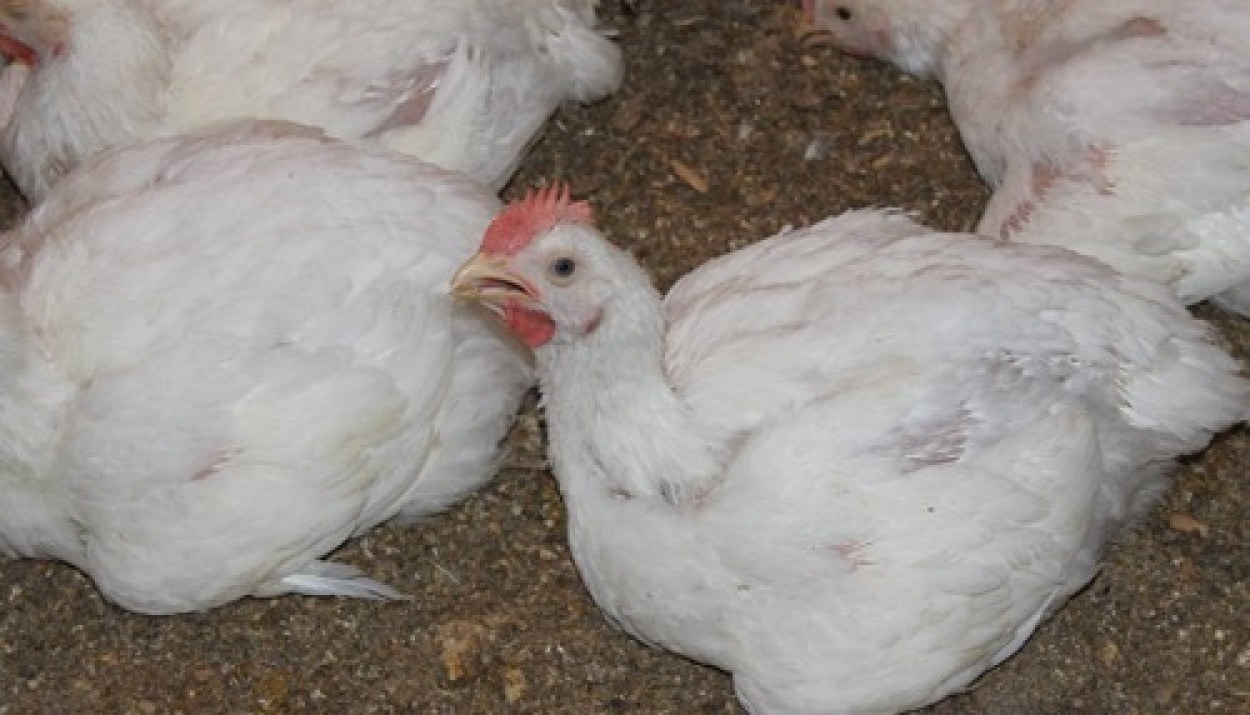
The Causes and Management of Diarrhoea in Poultry
Pashu Sandesh, 22 Feb 2021
Dr Naresh Singh Kuntal1*, Dr Kuldeep Singh2 and Preeti Singh3
A normal bird dropping should be firm and brown with a white part on the top which is chicken urine (urates) as chickens urinate and defecate in one motion. A healthy bird also passes a caecal dropping (runny, foul-smelling and caramel colour) usually every 10th dropping. Caecal droppings are different in appearance because they are passing from the caeca instead of the large intestine. Any change in droppings like yellow foamy droppings or bloody droppings represent abnormal.
There are several various causes for diarrhoea in poultry. Some of the causes are fairly normal and will resolve on their own, while others can be problematic.
- Coccidiosis
- Parasitic infestation
- Viruses
- Bacterial infection
- Kidney damage
- Very high protein diet
- Overindulgence (Excess Food)
- Heat stress
- Antibiotics
- Toxic Ingestion
- Egg Yolk Peritonitis and Prolapsed Vent
Coccidiosis: it is a protozoan disease that causes bloody diarrhoea in poultry (
Parasitic infestation: parasites rarely cause diarrhoea in chickens but if they present in huge numbers they harm to gut and cause secondary bacterial diarrhoea by irritating the gut.
Viruses: There are a lot of viruses (mainly Rotavirus and Adenovirus) that can damage the gut and causing diarrhoea in birds. Virus infection may lead to secondary bacterial diarrhoea by damaging the bird’s intestine and then allows harmful bacteria to grow out of control in the intestine.
Bacteria: When there is a misbalance in useful and harmful bacteria in the intestine, diarrhoea occurs. It is thought that there are a number of reasons for this misbalance such as:
- Parasites, coccidiosis or viral diseases cause damage to the gut which causes the release of proteins from the damaged site, which acts as an ideal source of nutrients for Clostridia bacteria.
- Once the Clostridia grow it can damage the gut wall and worsening diarrhoea. In severe cases, the gut wall so badly damaged that bacteria can reach to blood and causing septicaemia which is usually fatal.
- A sudden change in diet also causes a sudden and overwhelming change in gut bacterial species as different foods encourage different bacterial species to grow in the gut.
- Dirty water or dirty drinkers are potential sources of bacteria (mainly E.coli), if birds used such water or drinker then these bacteria can directly cause damage to the gut or change the gut flora.
- A mouldy feed is a common problem of stored feed as mouldy feed contains fungal toxins which can cause damage to the gut.
Kidney Damage: A number of causes like Mycotoxins, viral diseases (infectious bronchitis), a diet too high in calcium and low in phosphorus and decreased water intake can result in kidney damage. Signs are depression, dehydration, pale combs, emaciation with loss of muscle mass and diarrhoea. A bird with a damaged kidney can produce urine in excessive quantity which mixes with the droppings before defecation. This made droppings to be more watery which causes owners to report diarrhoea.
Very high protein diet: There is malpractice to give a high protein diet (more than required) to chickens in an attempt to grow better. Using a feed having excessive levels of protein which is converted into urates and compel the bird to drink more and urinate more. It causes wetter droppings and leading to damp bedding which further gave rise to many problems.
Indulgence (Excess Food): excess food in poultry lead to diarrhoea but it should stop of its own accord after 24-36 hours.
Heat stress: in the summer season birds will decrease appetite and drink much more water than normal so they will likely develop diarrhoea.
Antibiotics: If birds are given antibiotics for any infection, birds will likely get diarrhoea. Antibiotics kill off the good bacteria along with the bad in the gut, so the gut will be depleted of useful bacteria.
Toxic Ingestion: birds are curious about most things, so they may take toxins along with their feed. Birds are susceptible to Mycotoxins (produced by mouldy feed or wet bedding), a wide range of plants and other toxins.
Egg Yolk Peritonitis and Prolapsed Vent: Egg Yolk Peritonitis is occurred due to malfunction in the transfer of the egg from the ovary to the infundibulum. The yolk goes into the peritoneum and becomes infected causing septicaemia. Prolapsed of Vent occurred due to an overly large egg among other things. Egg Yolk Peritonitis and Prolapsed Vent may lead to severe diarrhoea hence, need a veterinarian intervention.
Harmful effects of diarrhoea
Irrespective of the cause there are numbers of harmful effects of diarrhoea:
- Birds become lethargic and show weight loss as a damaged gut will absorb fewer nutrients than normal.
- Birds become dehydrated which may lead to death as a damaged gut cannot absorb as much water as the normal one.
- Bacteria will enter into the bloodstream from the severely damaged gut wall causing septicaemia and death
- Diarrhoea leads to both wetting and contamination of bedding, leading to discomfort for the birds and become a source of infection for the flock.
Treatment of diarrhoea in poultry
When birds have diarrhoea there are two important things to determine. Is the bird otherwise well apart from diarrhoea or not?
- If the bird is looking dull or has any additional symptoms like blood in the diarrhoea then as such needs veterinary intervention to treat it.
- If the bird has diarrhoea but is otherwise eating & drinking normally and looks fine then there is no need to panic. There is a number of things that can be done by poultry owner themselves to help their bird:
- If deworming was not done in the past three to four months then firstly deworm the birds.
- The most important thing to do is that the birds with diarrhoea keep hydrated.
- Electrolytes can be given in bird’s drinking water to maintain the normal electrolyte balance in the gut to help birds keep them hydrated.
- Add aniseed to give a pleasant taste to water, thus encouraging the dehydrated bird to drink.
- Biostop (It is a product containing tannins, a plant extract that helps in binding loose droppings) can be given to birds. The use of Biostop is very safe and can be given to the whole flock.
- Probiotics are given to help repopulate friendly bacteria and displace the harmful bacteria in the gut.
- Always ensure the availability of fresh clean drinking water and feed for the birds.
- Wet bedding is removed immediately to keep birds comfortable and safe as wet bedding is a potential source of infection for birds.
After recovery from diarrhoea bird will have lost a lot of weight so Chicken Vet Amino+ (a multivitamin product containing amino acids) and B vitamins can be given in water for at least five days.
Bird’s appetite can be stimulated by using Chicken Vet Energy (contains L-Carnitine) in water daily for five days.
Prevention of diarrhoea
There are a number of simple steps that can be taken by poultry owners to prevent diarrhoea in their birds:
- Feed birds with fresh, dry and in date commercial pellet or mash.
- Always ensure that birds have access to fresh clean drinking water.
- The Waterer of birds cleans regularly with fresh water and using a detergent at the weekly interval to prevent E.coli infection.
- Avoid drinking from puddles in the range since these often contain lots of harmful bacteria.
- Poultry cages are regularly clean and disinfect using a detergent followed by an approved disinfectant.
- Deworming of birds is done at least every six months and ideally every three months.
- Give probiotics every six weeks to top up the good bacteria in your birds gut.
- Add Biomos (absorb fungal toxins), mannan-oligosaccharides (bind harmful bacteria) and chelated minerals (absorbed readily) daily in the feed of birds.
- Some poultry owners use turkey feed for their birds (as turkey feed contains more protein) in an attempt to get better growth in their chickens. Poultry feed contains the required amount of protein for poultry and using a feed with excessive protein level leads to diarrhoea so avoid such practice.
- During hot hours of use Anilyte C (electrolyte) in drinking water for five days.
- During hot days provide cold water, a fan blowing cool air and providing sufficient shade which helps birds to bring their temperature down and prevent diarrhoea due to heat stress.
- Wet bedding is a potential source of infections for birds so wet bedding is removed immediately to keep birds comfortable and safe.
Dr Naresh Singh Kuntal1*, Dr Kuldeep Singh2 and Preeti Singh3
1. Teaching Associate, VCC, CVAS, Navania, Udaipur, RAJUVAS, Bikaner, Rajasthan
2. Teaching Associate, Department of Veterinary Parasitology, PGIVER, Jaipur, RAJUVAS, Bikaner, Rajasthan
3. PhD Scholar, Department of Veterinary Pharmacology, LUVAS, Haryana











































































